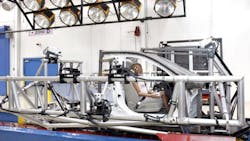Researchers hired by a coalition of automakers found that moisture – seeping from the environment into the inflator and not dried by a chemical – is the reason why Takata airbags rupture and spray shards of metal and plastic at motorists.
The findings from Orbital ATK, a Dulles, Va.-based company that makes rocket-propulsion systems, will be used by government regulators to determine how many vehicles equipped with Takata air bags need to be recalled. Determining the root cause of Takata’s inflator ruptures also has held back automakers and the supplier from deciding how recall costs should be shared.
All three of the conditions outlined in the statement – poor design, lack of water-absorbing chemicals and high atmospheric temperatures with wide ranges – have to be present for the airbag inflators to be at risk for rupture, said David Kelly, a former acting administrator of the National Highway Traffic Safety Administration. Kelly, who commented on the findings in the statement, was hired by the automaker group known as the Independent Testing Coalition to run the tests last year.
“We are confident this is the root cause for these vehicles,” he said in an interview.
The findings are specific to Takata inflators with ammonium nitrate that don’t also include a moisture-reducing chemical. Those inflators need long-term exposure to high-humidity climates with big differences in daytime and night temperatures, like those found in Florida, Kelly said. And their design allows moisture from high humidity to build up inside the inflator assembly, he said.
The group didn’t specify what it means by “long term,” but it’s more than a few days, Kelly said.
Even though today’s findings might help accelerate repairs, the affected vehicles could have to return to dealerships to get fixed yet again, if NHTSA decides the ammonium nitrate propellant itself is too unstable for on-board operating conditions, said Rebecca Lindland, a senior analyst for Kelley Blue Book.
“This recall is not going away any time soon,” she said, “and hopefully the death toll won’t rise while the investigation continues.”
Kelly said the group’s work so far was limited to investigating inflators in four specific NHTSA recalls covering 23 million inflators. An additional 5 million inflators are being recalled, and the group hasn’t yet looked at those designs.
“Identifying this multivariate root cause is an important first step,” Kelly said in the statement.
Automakers including Honda Motor Co. have recalled more than 19 million vehicles equipped with Takata airbags, the largest automotive safety recall in U.S. history. The exploding air bags have been linked to at least 10 deaths, most involving vehicles made by Honda, Takata’s biggest customer and a minority shareholder.
Some recalled models have airbags that might be susceptible over time to moisture intrusion, which in turn might cause the device’s inflator to rupture in a crash, Honda said previously.
Inflator Production
Takata produced about 87.3 million inflators with two kinds of ammonium nitrate propellant and supplied them to auto manufacturers in North America as of the end of June 2015, the company told NHTSA in response to an order issued that month.
The company might eventually have to recall all of them, U.S. Transportation Secretary Anthony Foxx said during a Nov. 3 press conference.
Production of replacement inflators was ongoing for at least a dozen automakers at that time, including Toyota, General Motors, BMW, Volkswagen and Tesla Motors, according to Takata’s response to the NHTSA order.
Federal investigators are reviewing the industry task force’s report while its investigation into all Takata ammonium nitrate-based inflators continues, said Gordon Trowbridge, a spokesman for NHTSA.
Safety Agreement
Under an agreement Takata signed last November, all inflators with ammonium nitrate will eventually be recalled unless Takata can prove their long-term safety, he said.
Separately, Takata has asked scientists at the Fraunhofer Institute in Germany to investigate the root cause of the ruptures. Honda also has commissioned its own investigation. Today’s findings were consistent with Takata’s own research, the company said in a statement.
“We fully cooperated with ITC to support their analysis, and we will continue to work closely with them, NHTSA and our customers to take aggressive actions that advance vehicle safety,’’ Takata said.
By John Lippert and Jeff Plungis, with assistance from Ma Jie
About the Author
Bloomberg
Licensed content from Bloomberg, copyright 2016.
